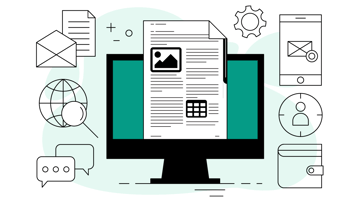Establishing a capture management process allows you to influence procurement outcomes by shaping customer requirements and expectations during the pre-solicitation phase.
This blog explores key capture challenges, the benefits of doing it right, and practical tips for building an effective strategy.
What is Capture Management?
Capture management—also known as capture planning—is the process of identifying opportunities, building relationships, gathering intel, and developing a strategy to win a specific opportunity. A well-developed capture plan increases your chances of success.
Typical capture plan components include:
- Opportunity Identification
- Competitor Research and Analysis
- Cost-Benefit Analysis
- Customer Pain Point Analysis
- Action Plan Development
By investing resources 12–24 months before an RFP or tender is issued, capture planning can deliver game-changing advantages.
Insights and More Precise Proposals
Competitive procurements are high-stakes. Imagine you're a business development manager at a subsea engineering firm. A major operator announces an upcoming bid for a new project.
Winning would mean significant revenue—and recognition.
With a strong capture process in place, you can:
- Identify Opportunities Early: Your team spots this opportunity months in advance and researches Oceanic Energy’s past projects, buyers, and decision-makers.
- Build a More Qualified Pipeline: Better information informs faster go/no-go decisions and smarter resource allocation.
- Strengthen Relationships: You've already built credibility with stakeholders and aligned your value proposition with their needs.
- Sharpen Your Win Strategy: Competitive and client insight helps you craft compelling differentiators and address likely objections.
- Craft Stronger Proposals: All this preparation leads to more tailored, persuasive, and customer-focused submissions.
The Time and Intel Imperative
Without a clear understanding of the client and a plan to win—before the RFP lands—you’re operating in the dark.
Common challenges that slow or derail capture efforts include:
- Data Silos: Information is scattered across tools and teams, leading to gaps or inaccuracies.
- Limited Knowledge Sharing: Poor collaboration slows decision-making and action planning.
- Manual Data Aggregation: Time-consuming and error-prone processes reduce efficiency.
- Inconsistent Templates: Lack of standardization causes misinterpretation and formatting issues.
- Inefficient Feedback Loops: Traditional feedback methods create confusion and delays.
- Change Tracking Issues: Manual tracking complicates collaboration and accuracy.
- Version Control: Without a central source of truth, teams waste time reconciling edits.
- Security Risks: Emailing sensitive intel increases the risk of leaks or breaches.
Capture Management Process
Capture management includes structured steps to identify, qualify, and pursue high-value opportunities. It enhances ROI, improves targeting, and allows for greater influence over outcomes.
Your competitors may already be engaging stakeholders and shaping requirements. If you delay, you're at a serious disadvantage.
Here's how the process works:
Opportunity Identification
Research markets and accounts. Define your opportunity criteria and goals. Evaluate potential deals based on value and risk, using both quantitative and qualitative inputs.
Competitor Research and Analysis
Analyze competitors’ strengths, weaknesses, client relationships, and historical performance. Identify gaps you can exploit.
Cost-Benefit Analysis
Assess the investment versus potential return. Use Price-to-Win (PWIN) methodologies to understand what the client values and what competitors may offer. Align pricing and value with client priorities.
Client Pain Points Analysis
Understand unmet needs, frustrations, and goals. Use these insights to define your messaging, solution positioning, and proposal content.
Action Plan
Build a roadmap for winning the deal, including:
- Solution Framework: Map your offering to client pain points. Prioritize based on buyer value.
- Win Strategy: Differentiate your solution, pricing, staffing, and approach from competitors.
- Communications: Plan touchpoints with stakeholders. Align sales and marketing to support outreach.
- Client Engagement: Develop relationships with key decision-makers and influencers.
Develop a Winning Proposal
Work with your proposal manager to translate capture insights into a persuasive, evaluator-friendly proposal. Set a strong kickoff direction and provide writers with the context and tools they need.
Tips for Effective Capture Management
Recognition, trust, and credibility win contracts. Capture management helps build all three—before the bid process even begins.
To make your process more effective:
- Set SMART goals to track and improve your capture performance.
- Hold regular strategy sessions to ensure solution alignment.
- Link your capture plan to your go/no-go criteria.
- Brief your proposal team early to streamline development.
- Set checkpoints to reassess intel, risks, and win probability.
- Train your team in listening, communication, and questioning skills.
- Use social media to stay visible and credible with prospects.
- Watch for “wired” solicitations—short deadlines can signal capture by a competitor.
In a hyper-competitive market, proactive engagement is critical. With the right capture plan, your business becomes the obvious choice for clients—not just another bidder.











